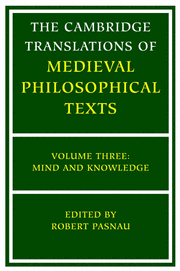Book contents
- Frontmatter
- Contents
- Acknowledgments
- General Introduction
- 1 ANONYMOUS (Arts Master c. 1225) The Soul and Its Powers
- 2 ANONYMOUS (Arts Master c. 1270) Questions on De anima I–II
- 3 BONAVENTURE Christ Our One Teacher
- 4 HENRY OF GHENT Can a Human Being Know Anything?
- 5 HENRY OF GHENT Can a Human Being Know Anything without Divine Illumination?
- 6 PETER JOHN OLIVI The Mental Word
- 7 WILLIAM ALNWICK Intelligible Being
- 8 PETER AUREOL Intuition, Abstraction, and Demonstrative Knowledge
- 9 WILLIAM OCKHAM Apparent Being
- 10 WILLIAM CRATHORN On the Possibility of Infallible Knowledge
- 11 ROBERT HOLCOT Can God Know More than He Knows?
- 12 ADAM WODEHAM The Objects of Knowledge
- Textual Emendations
- Bibliography
- Index
9 - WILLIAM OCKHAM Apparent Being
Published online by Cambridge University Press: 23 December 2009
- Frontmatter
- Contents
- Acknowledgments
- General Introduction
- 1 ANONYMOUS (Arts Master c. 1225) The Soul and Its Powers
- 2 ANONYMOUS (Arts Master c. 1270) Questions on De anima I–II
- 3 BONAVENTURE Christ Our One Teacher
- 4 HENRY OF GHENT Can a Human Being Know Anything?
- 5 HENRY OF GHENT Can a Human Being Know Anything without Divine Illumination?
- 6 PETER JOHN OLIVI The Mental Word
- 7 WILLIAM ALNWICK Intelligible Being
- 8 PETER AUREOL Intuition, Abstraction, and Demonstrative Knowledge
- 9 WILLIAM OCKHAM Apparent Being
- 10 WILLIAM CRATHORN On the Possibility of Infallible Knowledge
- 11 ROBERT HOLCOT Can God Know More than He Knows?
- 12 ADAM WODEHAM The Objects of Knowledge
- Textual Emendations
- Bibliography
- Index
Summary
Introduction
William Ockham (ca. 1288–1347) made his reputation as a brilliant logician and iconoclastic theologian. In 1324, controversy over his views forced him to abandon his scholarly work in England and confront charges of heresy before the pope in Avignon. Rather than receiving an acquittal, Ockham became involved in further controversies, was excommunicated, and spent the last years of his life in exile in Munich, where his interests shifted from logic and metaphysics to politics and ecclesiastics.
Ockham is best known today for his parsimonious ontology, exemplified by his nominalism (or at least antirealism) regarding universals, and expressed by the famous principle of parsimony known as Ockham's razor: Plurality should not be posited without necessity. The selection translated here displays this parsimony at work in Ockham's theory of cognition. The central issue is the nature of mental representation. Ockham quotes at length, verbatim, from the work of his fellow Franciscan Peter Aureol (see Translation 8). Aureol had argued that all cognition, sensory and intellectual, requires that the object itself take form in what Aureol calls “objective being” (esse obiectivum). The production of this sort of nonreal being is, for Aureol, precisely what accounts for the experience of being presented with an object (what we now call conscious experience). Ockham argues that there's no need to postulate this sort of “diminished being.” The act of cognition alone, along with the external object, is entirely sufficient; no intermediary is required. The most problematic cases are those where there is no corresponding external object.
- Type
- Chapter
- Information
- The Cambridge Translations of Medieval Philosophical Texts , pp. 219 - 244Publisher: Cambridge University PressPrint publication year: 2002

